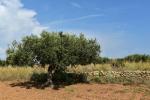JILOCA WINERIES AND VINEYARDS Operational Group
- Type Operational group
- Status In progress
- Execution 2023 -2027
- Assigned Budget 150.000,00 €
- Scope Autonómico
- Autonomous community Aragón
- Main source of financing CAP 2023-2027
- Project website GO BODEGAS Y VIÑEDOS DEL JILOCA
Objective: Review and census of abandoned vineyards to aid in their recovery. Vinification of old single-varietal varieties. Member contributions are distributed as follows: ASSOCIATION FOR THE RECOVERY OF THE VINEYARD AND WINE-GROWING TRADITION OF THE JILOCA VALLEY (COORDINATOR AND BENEFICIARY)
They will be responsible for coordination, drafting reports, and submitting applications and supporting documentation. They will perform the following tasks: Inventory of plots and inclusion in a jointly managed vineyard pool. Visits to identify and assess the measures to be implemented on the plots. Contact with the owners and sign the plot transfer contract. Intervention tasks in the vineyard to bring it into production based on the annual vine cycle (pruning, tillage, complementary actions, and harvest).
Our mission is to prevent the loss of winemaking potential by restoring vineyards facing extinction and bringing them back into production. An association dedicated to the restoration of plots and vineyards in the Jiloca Valley.
JILOCA VINEYARDS AND WINERIES AS A CENTER FOR ENHANCING TRADITIONAL VINEYARD CROPS IN THE AREA.
Objective: To review and census abandoned vineyards to aid in their recovery. Vinification of old single-varietal varieties. Member contributions are distributed as follows.
ASSOCIATION FOR THE RECOVERY OF THE VINEYARD AND WINE-GROWING TRADITION OF THE JILOCA VALLEY (COORDINATOR AND BENEFICIARY)
They will be responsible for coordination, drafting the report, and submitting applications and justifications. They will carry out the following actions: Inventory of plots and inclusion in a jointly managed vineyard pool. Visits to identify and assess the measures to be implemented on the plots. Contact with the owners and signing of the plot transfer contract. Intervention tasks in the vineyard to bring it into production based on the annual vine cycle (pruning, tillage, complementary actions, and harvest). Dissemination, workshops, and project transfer.
SANTO TOMÁS DE AQUINO REGIONAL COOPERATIVE OF DAROCA (BENEFICIARY)
Experimentation with new winemaking techniques, producing more modern wines that are better accepted by the market. Separation of varieties as much as possible for independent winemaking. Promotion of wines from traditional old vines (Garnacha, Negralejo, Provechón, Macabeo, etc.). Promotion of wineries' communication, networks, and websites to encourage online sales. Attendance at regional, regional, and national fairs. Increased presence in local bars, restaurants, and retail stores. Wine presentation sessions at the regional, regional, and regional levels. Marketing of new wines and modern formats adapted to the market. Promotion of the project, workshops, and transfer.
JILOCA VINEYARDS AND WINERIES AS A CENTER FOR ENHANCING TRADITIONAL VINEYARD CROPS IN THE AREA.
Objective: To review and census abandoned vineyards to aid in their recovery. Vinification of old single-varietal varieties. Member contributions are distributed as follows.
ASSOCIATION FOR THE RECOVERY OF THE VINEYARD AND WINE-GROWING TRADITION OF THE JILOCA VALLEY (COORDINATOR AND BENEFICIARY)
They will be responsible for coordination, drafting the report, and submitting applications and justifications. They will carry out the following actions: Inventory of plots and inclusion in a jointly managed vineyard pool. Visits to identify and assess the measures to be implemented on the plots. Contact with the owners and signing of the plot transfer contract. Intervention tasks in the vineyard to bring it into production based on the annual vine cycle (pruning, tillage, complementary actions, and harvest). Dissemination, workshops, and project transfer.
SANTO TOMÁS DE AQUINO REGIONAL COOPERATIVE OF DAROCA (BENEFICIARY)
Experimentation with new winemaking techniques, producing more modern wines that are better accepted by the market. Separation of varieties as much as possible for independent winemaking. Promotion of wines from traditional old vines (Garnacha, Negralejo, Provechón, Macabeo, etc.). Promotion of wineries' communication, networks, and websites to encourage online sales. Attendance at regional, regional, and national fairs. Increased presence in local bars, restaurants, and retail stores. Wine presentation sessions at the regional, regional, and regional levels. Marketing of new wines and modern formats adapted to the market. Promotion of the project, workshops, and transfer.
- Lines aimed at grafting border plants, thus increasing the number of plants, allowing for an increase in the planting density of farms.
- The mass population best adapted to the plot is studied, experimenting with various grafting techniques and dates, taking into account the age of the vines. Replanting is carried out, with a prior soil study, to select the best rootstock and technique to use.
- Application of new cultivation techniques such as canopy maintenance, new pruning and training systems, and the use of new technologies for monitoring crop health.
- Conversion and certification to organic farming and agroecology, which will lead to higher-quality wines, making both the PGI and PDO in the Ribera del Jiloca a benchmark for high-quality natural wines. Experimentation will be carried out in the application and use of organic fertilizers from different livestock farms, composting, and formulations.
- A study of soil microbiota in different vineyards and conclusions on winegrower interventions to achieve the best natural wines.
- Study on the negative factors that affect or could affect the balance and self-regulation of the area's vineyards. Study on the diseases that affect the area's old vineyards.
- Production with spontaneous fermentation. Production of orange wines. Promotion of communication, networks, and winery websites to encourage online sales.
- Attendance at regional, regional and national fairs.
- Increased presence in the area's bars, restaurants, and retail stores. Wine presentation events at both the county and regional levels.
- Marketing of new, modern wines adapted to the market.
- Market new formats.
- Dissemination, Conferences and Project Transfer
Main Objective: The main objective of this project is to save and protect the endangered vineyards of Jiloca. These vineyards, due to the lack of generational renewal, are facing abandonment and the loss of their enormous heritage, landscape, and economic development potential, allowing for the diversification of the economy and the rural world. Vision, Minisón, and Values: To prevent the loss of the area's winemaking potential by restoring the winemaking landscape and creating a network of vineyards that are in danger of disappearing and bringing them into production.
- Coordinator/entity name: FELIPE GONZALO CORTES
- Postal address: C/ MAYOR, 44 - 50.360-DAROCA (ZARAGOZA)
- Coordinator/entity email: paisajesdeljiloca@gmail.com
- Telephone: 659231315
Study of soil biological activity in vine plantations. Application of plant growth-promoting bacteria to improve the resilience of vine plantations to climate change. Monitoring and selection of vine strains for germplasm banks. Application of different agricultural techniques to recover and replace missing vines in old vineyards. Project dissemination, workshops, and transfer.
- FELIPE GONZALO CORTES
- COOPERATIVA STO. TOMÁS DE AQUINO DE DAROCA (darocabodega@gmail.com)
- PAGO DE LA BOTICARIA (pilar@pagodelaboticaria.com)
- FELIPE GONZALO CORTES





